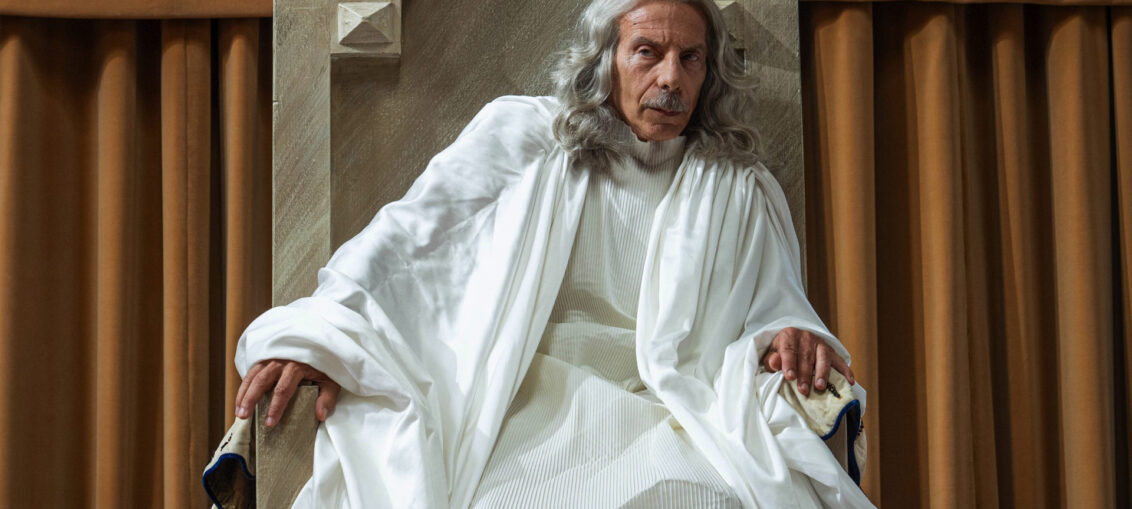
Where man cannot reach, a sincere and heartfelt prayer can reach the ears of God
 #My goodness it's a film from 2023 directed by Francesco Amato , screenplay by : Salvatore Ficarra, Valentino Picone, Francesco Amato, David Lantieri, Fabrizio Testini, with : Giovanni, Salvatore Ficarra, Valentino Picone, Barbara Ronchi, Maria Chiara Giannetta.
#My goodness it's a film from 2023 directed by Francesco Amato , screenplay by : Salvatore Ficarra, Valentino Picone, Francesco Amato, David Lantieri, Fabrizio Testini, with : Giovanni, Salvatore Ficarra, Valentino Picone, Barbara Ronchi, Maria Chiara Giannetta.
Synopsis: Aristide (Picone) he is an angel assigned to the prayer sorting office who dreams of a transfer to the choir of the Most High(Giovanni). During an assembly of the cherubic assembly they vote whether to eliminate humanity with a definitive universal flood to punish it for its wickedness, or send a new messiah to earth as a last chance before extinction. The second option is ticked, and someone will have to come down and impregnate a woman with the new son of God. Aristide volunteers, hoping that this will be his chance to obtain the coveted promotion to the angelic choir as a reward: once landed, he will have to place his hand on the belly of a chosen one, and the game will be done. But due to a series of misunderstandings he will end up touching Nicola's belly instead(Ficarra), a vice principal at odds with his wife (Barbara Ronchi), who will find herself pregnant with the messiah. And in order to return to Paradise, Aristide will have to find a way to repair the mess he has committed.
Review
 “Never lose faith”, “Where man cannot reach, a sincere and heartfelt prayer can reach the ears of God". These are some of the teachings/warnings that I remember receiving during catechism. Man entrusts himself to God out of necessity, need, but above all for futile and selfish reasons. Humankind has truly failed every possibility of redemption, deserving the wrath of the Most High? Let's stop with the theological questions because we risk writing nonsense and losing "the right path" of this review.
“Never lose faith”, “Where man cannot reach, a sincere and heartfelt prayer can reach the ears of God". These are some of the teachings/warnings that I remember receiving during catechism. Man entrusts himself to God out of necessity, need, but above all for futile and selfish reasons. Humankind has truly failed every possibility of redemption, deserving the wrath of the Most High? Let's stop with the theological questions because we risk writing nonsense and losing "the right path" of this review.
But it is precisely these questions that represent the narrative inspiration of "Santocielo", the new film by the close-knit Sicilian couple made up of Ficarra and Picone. Discussing religion is itself a complex and slippery terrain, let alone staging a film, but not for Ficarra and Picone until after “Il Primo Natale” of 2019, continue in their creative and dramaturgical mission decidedly "against the grain". “Santocielo” by Francesco Amato addresses controversial issues such as: the uterus for rent, divorce, Catholic bigotry and prejudice against those who are different in a "satirical" way , but focusing on a screenplay that is only partially up to the task. #Santocielo starts in a slow and forced way in the celestial prologue and subsequently in the first meeting at the bar between the angel Aristide and Nicola, inconsolable for the separation decided by his wife. Ficarra and Picone work, they have fun, they are comfortable in their respective roles, but it's the story that struggles to take off. And, there are some pleasant passages "playing" on Sicilian prejudice and culture compared to "modernity"., but the film takes shape when the duo becomes a trio with the arrival of Giovanna (a credible and versatile Barbara Ronchi) , wife of Nicholas, went into crisis with her new partner.
 The angel, the pregnant man and his wife form an unlikely yet tasty trio, changing the pace of the film , but above all giving shape and meaning to the creative requests of the Palermo duo. On the one hand, the screenwriters probably had the authorial ambition of pricking and shaking up the hypocrisy and false respectability of society, as he did in 1999 the disputed “Dogma” by Kevin Smith , but definitely failing the objective. On the other hand, they wanted to re-evaluate the deeper meaning of prayer and not so much the more bizarre requests, and in this case the message definitely arrived with a poetic and symbolic ending.
The angel, the pregnant man and his wife form an unlikely yet tasty trio, changing the pace of the film , but above all giving shape and meaning to the creative requests of the Palermo duo. On the one hand, the screenwriters probably had the authorial ambition of pricking and shaking up the hypocrisy and false respectability of society, as he did in 1999 the disputed “Dogma” by Kevin Smith , but definitely failing the objective. On the other hand, they wanted to re-evaluate the deeper meaning of prayer and not so much the more bizarre requests, and in this case the message definitely arrived with a poetic and symbolic ending.
In conclusion #Santocielo is definitely not the best film by the Ficarra-Picone duo, nor the ugliest obviously. It's a middle ground that overall leaves room for some "intelligent" laughter, but without the spectator exclaiming a convinced “holy heavens…what a great movie!”
Vittorio de Agrò (RS)
